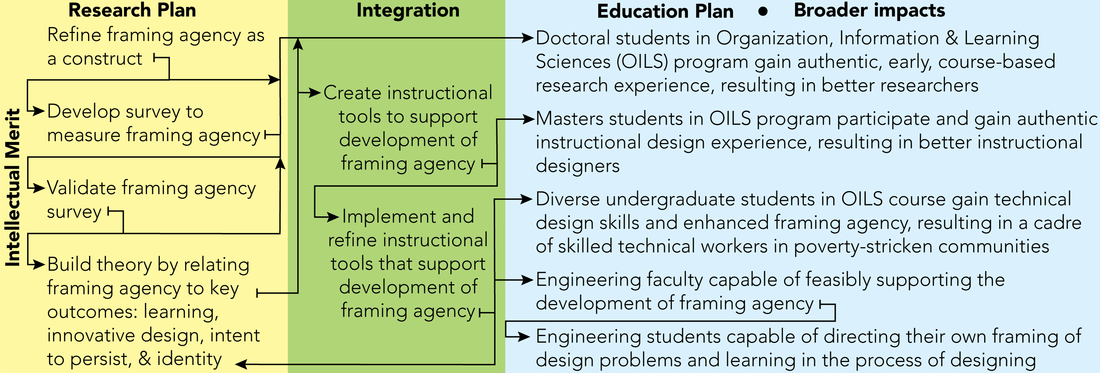The FRAME Project goals & objectives
The goal of this project is to introduce the construct, framing agency and build theory by relating it to key outcomes. The goal will be met through specific research (R) and education (E) objectives:
- R1: Phase 1: refine framing agency as a construct using qualitative analysis of existing cases;
- R2: Phase 2: develop a valid and reliable measure of framing agency;
- R3: Phase 3: relate framing agency to key outcomes, such as innovative design and identify formation; and
- E1: Phase 4: develop and implement a constellation of instructional tools to support framing agency.
Phase 1: Understanding Framing Agency as a construct
Using interaction and discourse analysis, we analyze existing data to answer the following questions:
RQ1a: How and when do students make decisions that are consequential to their designing & learning?
RQ1b: What actions and resources support students to (re)frame their problems?
Phase 2: Measuring Framing Agency
We will develop and validate a survey to answer the following questions:
RQ2a: What themes emerge from participants’ talk about their framing agency in specific contexts?
RQ2b: Which themes must be included to reliably and validly measure framing agency?
Phase 3: Building theory about Framing Agency
We will conduct regression modeling to answer the following questions:
To what extent does framing agency explain variance in:
RQ3a: intent to persist in engineering?
RQ3b: professional engineering identity development?
RQ3c: relevant learning outcomes?
RQ3d: innovative design outcomes?
Phase 4: Supporting the development of Framing Agency
We will conduct design-based research to answer the following questions:
How might the following support the development of framing agency?
RQ4a: Explicit positioning of students as designers who must formulate the problem.
RQ4b: A wrong theory protocol that helps students understand and generate novel ideas about the problem.
RQ4c: Design conjecture/reflection maps that support students to trace the development of their understanding of decisions related to the problem over time.
Using interaction and discourse analysis, we analyze existing data to answer the following questions:
RQ1a: How and when do students make decisions that are consequential to their designing & learning?
RQ1b: What actions and resources support students to (re)frame their problems?
Phase 2: Measuring Framing Agency
We will develop and validate a survey to answer the following questions:
RQ2a: What themes emerge from participants’ talk about their framing agency in specific contexts?
RQ2b: Which themes must be included to reliably and validly measure framing agency?
Phase 3: Building theory about Framing Agency
We will conduct regression modeling to answer the following questions:
To what extent does framing agency explain variance in:
RQ3a: intent to persist in engineering?
RQ3b: professional engineering identity development?
RQ3c: relevant learning outcomes?
RQ3d: innovative design outcomes?
Phase 4: Supporting the development of Framing Agency
We will conduct design-based research to answer the following questions:
How might the following support the development of framing agency?
RQ4a: Explicit positioning of students as designers who must formulate the problem.
RQ4b: A wrong theory protocol that helps students understand and generate novel ideas about the problem.
RQ4c: Design conjecture/reflection maps that support students to trace the development of their understanding of decisions related to the problem over time.
INTERDISCIPLINARY VULNERABILITY EXERCISE
Interdisciplinary Vulnerability Exercise (IVE) is a practice used to (1) vet potential collaborators, (2) establish trust and reciprocity and (3) support the ability of members of a project to speak intelligently about each others’ work. IVE is typically conducted at the conclusion of an initial meeting of new colleagues from different disciplines interested in working on a specific project together. Each colleague writes a paragraph as if written by each other colleague. This helps establish a level of shared understanding and acknowledgement that each member has expertise. This practice is also an effective way to weed out those uninterested in real collaboration. New collaborators should anticipate engaging in this practice!
Interdisciplinary Vulnerability Exercise (IVE) by Vanessa Svihla is licensed under a Creative Commons Attribution-NonCommercial-ShareAlike 4.0 International License.
Interdisciplinary Vulnerability Exercise (IVE) by Vanessa Svihla is licensed under a Creative Commons Attribution-NonCommercial-ShareAlike 4.0 International License.
NARROW TERMINOLOGICAL APPARATUS + SHARED LEXICON
Lab members should expect to participate collaboratively, even when they are somewhat uncertain of the territory. To support this, all members should enforce the following:
- Maintain a narrow and shared terminological apparatus. Confused? Good! What this really means is that you should avoid jargon and acronyms (alphabet soup). While a few clearly defined technical terms are always welcome, jargon for the sake of jargon is not. Make the ideas smart—don't rely on the words to make the ideas sound smart. Give others access to the important technical terms you are using but providing definitions and (counter)examples.
- Avoid synonyms and be precise. In social sciences research, some of our everyday words also have technical intent. In school, you were probably taught to use synonyms to make the writing more interesting. In research, one of our main goals is clarity. Using synonyms (e.g., student, learner, pupil, youth, etc.) can erode that clarity.
- Being a novice is a short-lived superpower in research. Outsider points of view can usher in innovation. Not every naive idea is good, but in this lab, outside ideas are welcomed and valued.

This material is based upon work supported by the National Science Foundation under Grant No. EEC 1751369. Any opinions, findings, and conclusions or recommendations expressed in this material are those of the authors and do not necessarily reflect the views of the National Science Foundation.
Proudly powered by Weebly
